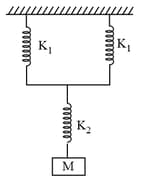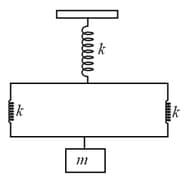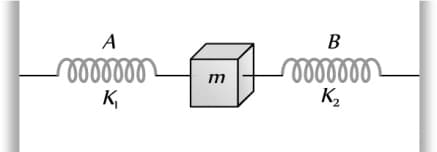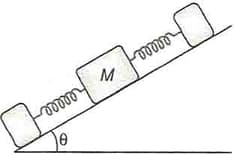Oscillations of a Spring - Block System
Oscillations of a Spring - Block System: Overview
This topic covers concepts such as Spring - Block System etc.
Important Questions on Oscillations of a Spring - Block System
A block of mass is at rest on an another block of same mass as shown in figure. Lower block is attached to the spring, then the maximum amplitude of motion so that both the block will remain in contact is:

The equivalent spring constant of the system as shown in figure will be :

Let be the spring constant of a spring. If the spring is cut into two equal parts, then spring constant of each part is
If the mass shown in figure is slightly displaced and then let go, then the system shall oscillate with a time period of

Two blocks, each of mass , are connected with springs, each of force constant , as shown in the figure. The mass is displaced to the left and mass to the right by the same amount and released. Assuming the collision to be elastic, the time period of oscillation is

A mass is suspended from a light spring. An additional mass added, displaces the spring further by a distance . Now, the combined mass will oscillate on the spring with time period
Natural length of the spring is and its spring constant is A mass of is hung from it. The extension produced in the spring is
(Given )
One end of a spring of force constant is fixed to a vertical wall and other to a body of mass resting on smooth horizontal surface. There is another wall at a distance of from the body. If all the collisions are elastic and spring is compressed by and released, then the time period of oscillation is

A mass on the end of a spring undergoes simple harmonic motion with a frequency of 0.5 Hz. If the attached mass is reduced to one quarter of its value, then the new frequency in Hz is
A body of mass m is suspended from vertical spring and is set into simple harmonic oscillations of time period . Next the spring is fixed at one end on a smooth horizontal table and same body is attached at the other end. The body is pulled slightly and then released to produce horizontal oscillations of the spring. The time period of horizontal oscillations is
A mass is suspended from a spring of negligible mass. The spring is pulled a little and then released so that the mass executes SHM of time period . If the mass is increased by , the time period becomes , then the ratio of is-
Assertion: If a man with a spring-loaded wristwatch on his hand falls from the top of a tower, his watch gives the correct time during the free fall.
Reason: The working of the wristwatch depends on the action of a spring and the restoring force of spring has nothing to do with gravity.
Assertion: If a man with wrist watch on his hand falls from the top of a tower, its watch gives correct time during the free fall.
Reason: The working of the wrist watch depends on spring action and it has nothing to do with gravity.
A block is hanged from spring in a cage. Elongation in spring is and when the cage moves up and down respectively with the same acceleration. The expansion in spring when the cage move horizontally with the same acceleration -
and are massless supports attached to two springs, both the springs are identical and light. Friction coefficient between block and horizontal surface is .When both the springs are in their natural length block was given a velocity of towards right. Then the distance travelled by block before coming to rest for the first time is :

In arrangement given in figure, if the block of mass is displaced, the frequency is given by

If the mass of an oscillator is numerically equal to its force constant, then the frequency is
A particle of mass executes SHM. The restoring force is provided by a spring of force constant . The time period of oscillation is
On a smooth inclined plane, a body of mass is attached between two springs. The other ends of the springs are fixed to firm support. If each spring has force constant , the period of oscillation of the body (assuming the springs as massless) is

What will be the force constant of the spring system shown in figure?

